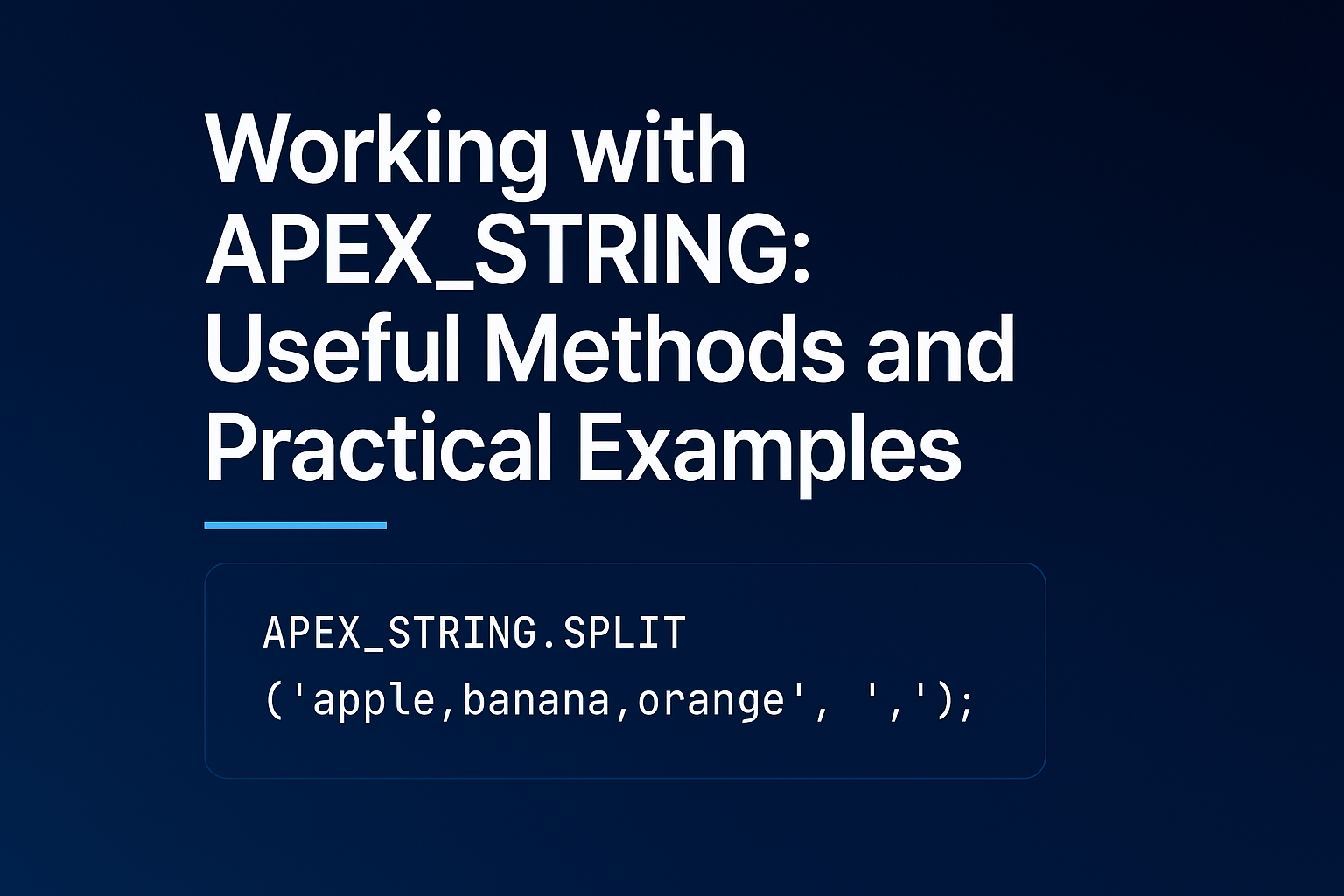🔤 Working with APEX_STRING: Useful Methods and Practical Examples
 Bruno Cardoso
Bruno Cardoso
Introduction
I bet that you missed me!
When working with Oracle APEX and PL/SQL, we often deal with strings in a more advanced way — whether it's parsing delimited values, escaping characters, or handling nulls. Oracle APEX provides a great utility package for this: APEX_STRING.
In this article, I’ll guide you through the most commonly used functions in the APEX_STRING package, with practical examples to help you understand when and how to use them.
What is APEX_STRING?
APEX_STRING is a built-in package provided by Oracle APEX that offers useful functions for working with strings, particularly for web-based applications. It helps handle delimited strings, parsing values, and more.
Let’s take a look at the most useful procedures and functions available in this package.
🧪 Commonly Used Methods
1. APEX_STRING.PUSH
This method allows you to dynamically add elements into an APEX_T_VARCHAR2 collection/array, which is useful when building string arrays programmatically.
DECLARE
l_values apex_t_varchar2;
BEGIN
apex_string.push(l_values, 'First');
apex_string.push(l_values, 'Second');
apex_string.push(l_values, 'Third');
FOR i IN 1 .. l_values.COUNT LOOP
DBMS_OUTPUT.put_line(l_values(i));
END LOOP;
END;
Output:
First
Second
Third
2. APEX_STRING.SPLIT
DECLARE
l_values apex_t_varchar2;
BEGIN
l_values := apex_string.split('apple,banana,orange', ',');
FOR i IN 1 .. l_values.COUNT LOOP
DBMS_OUTPUT.put_line(l_values(i));
END LOOP;
END;
/*
output:
apple
banana
orange
*/
3. APEX_STRING.SPLIT_NUMBERS
A variant of SPLIT, but returns a table of numbers instead of strings.
DECLARE
l_numbers apex_t_number;
BEGIN
l_numbers := apex_string.split_numbers('10,20,30', ',');
FOR i IN 1 .. l_numbers.COUNT LOOP
DBMS_OUTPUT.put_line('Value: ' || l_numbers(i));
END LOOP;
END;
Output:
Value: 10
Value: 20
Value: 30
4. APEX_STRING.JOIN
DECLARE
l_result VARCHAR2(4000);
BEGIN
l_result := apex_string.join(apex_t_varchar2('a','b','c'), '-');
DBMS_OUTPUT.put_line(l_result); -- Output: a-b-c
END;
5. APEX_STRING.STRING_TO_TABLE
Convert a string of names into a PL/SQL collection/array:
DECLARE
l_string VARCHAR2(4000) := 'Ana,Bruno,Carla,Diego,Elisa';
l_nomes APEX_APPLICATION_GLOBAL.VC_ARR2;
BEGIN
l_nomes := apex_string.string_to_table(l_string, ',');
FOR i IN 1 .. l_nomes.COUNT LOOP
DBMS_OUTPUT.put_line('Name ' || i || ': ' || TRIM(l_nomes(i)));
END LOOP;
END;
/*output:
Name 1: Ana
Name 2: Bruno
Name 3: Carla
Name 4: Diego
Name 5: Elisa
*/
6. APEX_STRING.TABLE_TO_STRING
Convert employee names into a single comma-separated string:
DECLARE
l_nomes APEX_APPLICATION_GLOBAL.VC_ARR2;
l_string VARCHAR2(4000);
BEGIN
SELECT first_name
BULK COLLECT INTO l_nomes
FROM employees
WHERE ROWNUM <= 5;
l_string := apex_string.table_to_string(l_nomes, ', ');
DBMS_OUTPUT.put_line('Employees: ' || l_string);
/*
output:
Employees: Ellen, Sundar, Mozhe, Shelli, Amit
*/
END;
🔄 Bonus: Combine SPLIT + JOIN
Example: Uppercase all elements in a delimited string:
DECLARE
l_values apex_t_varchar2;
l_result VARCHAR2(4000);
BEGIN
l_values := apex_string.split('apex,plsql,oracle', ',');
FOR i IN 1 .. l_values.COUNT LOOP
l_values(i) := UPPER(l_values(i));
END LOOP;
l_result := apex_string.join(l_values, ',');
DBMS_OUTPUT.put_line(l_result); -- Output: APEX,PLSQL,ORACLE
END;
Conclusion
The APEX_STRING package is a powerful utility for string manipulation in Oracle APEX and PL/SQL. It simplifies common tasks that otherwise would require more verbose or complex logic.
Now with methods like PUSH and SPLIT_NUMBERS, you can handle dynamic value collections/arrays more efficiently — especially when generating queries or dealing with JSON or CSV inputs.
If you're working on dynamic SQL, parsing values from forms, or building UI components in APEX, mastering APEX_STRING will definitely boost your productivity.
Let me know in the comments if you’d like a deep dive on how to use these utilities inside dynamic SQL or APEX reports!
Subscribe to my newsletter
Read articles from Bruno Cardoso directly inside your inbox. Subscribe to the newsletter, and don't miss out.
Written by

Bruno Cardoso
Bruno Cardoso
I'm a APEX Senior developer who likes write down what I discover to keep a part of my mind stored and share my knowing with others.